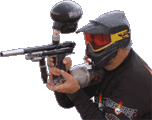  |
|
|
|
|
|
|
  |
|
|
|
|
|
|
|
A minority opinion of sorts.
In Reply to: Is low pressure any good posted by the_only_rhino88 on April 09, 2003 at 22:51:39:
|
|
Posted by: Dale "Head_Hunters" DuPont on April 16, 2003 at 10:11:52
|
You have two regulators that are set at two different operating pressures. Some of your responses may have confused you. The inline Main Reg controls the operating pressure supplying the valve/bolt to accelerate the ball. The front reg controls the operating pressure of the pneumatic recocking system. It operates off of the chamber between the inline reg and valve. The inline reg supplies the pressure and volume for the secondary front pneumatic regulator. When using the term 'Low Pressure' people are refering to the Main In line regulator pressure. Stock is 450-500 psi and LP is generally considered sub 300 psi operating pressure. The front reg operates in the 80 - 125 psi. Otherwise you blow the hoses off the pneumatics. The two regs operate independently of each other. You can change the inline operating pressure and not affect the operating pressure or operation of the front pneumatics. The only exception is if the inline pressure drops below the 80-125 psi range. You lower the front reg to minimize "chops" when you short stroke or misfeed a ball. If the front pressure is low enough and the ball shell strong enough, it will "jam" and can be cleared (hopefully) with a manual cock or another cycle of the pneumatics recocking the marker. The pressure and thus FORCE of the ram closing the bolt is what "chops" a ball in half. Now back to "Low Pressure". 1. The benefits are: Slower RATE of Acceleration for the ball in the barrel. This is the MAJOR Benefit of LP. The ball is flattened front to back like a donut when accelerating down the barrel. If the shell flexs too much, it breaks. You can expect fewer barrel breaks especially during cold weather play. 2. Potentially more shots per tank fill or "efficiency". If you buy all day air when you play this isn't an performance issue. If you take one tank out to the back 40 acres to play with your buddies, then "efficiency" can be a real performance issue. If you discharge more air than your ball and barrel can use, it is wasted air supply. It also creates a loud muzzle report. If you lower the pressure too much you can actually loose shot efficiency by holding the valve open so long that the ball is long gone out of the barrel and the valve is still dumping and wasting air out the barrel.
Due to the lack of excess air and pressure wave being discharged out the barrel. |
|
Follow Ups:
|
| Copyright © 1992-2019
Corinthian Media Services. WARPIG's webmasters can be reached through our feedback form. All articles and images are copyrighted and may not be redistributed without the written permission of their original creators and Corinthian Media Services. The WARPIG paintball page is a collection of information and pointers to sources from around the internet and other locations. As such, Corinthian Media Services makes no claims to the trustworthiness or reliability of said information. The information contained in, and referenced by WARPIG, should not be used as a substitute for safety information from trained professionals in the paintball industry. |